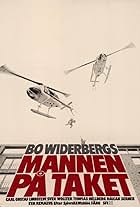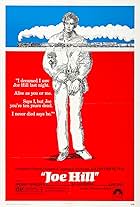Lowly Stockholm vice-squad officers, Jarnebring and Johansson, are first on the scene of a robbery and go on to unearth apparent corruption in high places, but the threads are difficult to pull together and the case is hard to crack.
There are so many pleasures in this film that it's a shame that it is so rarely seen. Quite apart from being a good thriller director Bo Widerberg brings twists and slants to what would otherwise be the sort of film that we've seen a hundred times. Although a buddy-buddy movie, J & J's relationship is constructed back-to-front. Instead of going from 'chalk & cheese' to reconciled dream-team, they begin as good friends, with implicit trust between them as colleagues, but the events of the film put this under strain. As a corollary there is no neat ending.
There are some good moments of humour as American and Swedish culture brush up against each other, but the greatest departure from the standard is the insight into Johansson's personal life. Occupying no more than a few minutes screen time, we see the result of his marriage break-up. The scene where he attempts to recapture his relationship with his son is almost painful and his furtive eye contact with another metro traveler is nicely captured. In fact, these brief interludes convey more about the loneliness of a failed relationship than many an entire film. Overall they add a rare depth to this genre. Add to this a great car-chase and the technique of putting a rear facing road-pointing camera on the front of a car, which brilliantly conveys menace.
There is also a well-developed sense of place with all the action set in a wintry Stockholm and it's environs. While we see the city's underbelly (down-and-outs; winos; criminals; alienated youth) it is still an affectionate portrait.
Twenty years on there are some non-P.C. moments as when a suspect is recognised partly as he is seems to be the only foreign-looking person in Stockholm. The ending can also be criticised for leaving a feeling that the ball is still in the air, but this is largely because we cinema-goers are so used to complete resolution.
This is the sort of film that should be made more often. Widerberg rivaled Peter Weir as a director who could make an entertaining yet meaningful and character-driven film.






























